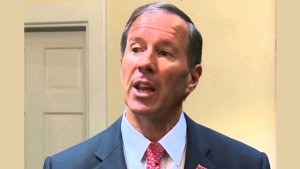
Premier of Bermuda Michael Dunkley
HAMILTON, Bermuda (CMC) — Bermuda’s House of Assembly remained closed yesterday after legislators were locked out by protesters who formed a human ring around the building in a continuing protest against government’s proposed Pathways to Status initiative.
Politicians were due to debate the controversial bill but an estimated 1,500 protesters, who stayed in the House grounds all day, demanded the status bill be withdrawn. At 6.15 pm yesterday the Rev Nicholas Tweed, spokesman for pressure group the People’s Campaign, announced that the One Bermuda Alliance (OBA) Cabinet had ‘gone home’.
He said that the Speaker of the House, Randy Horton, had said the House would reconvene on Wednesday but Tweed told protesters it did not mean they had won their fight.
“We have decided to return tomorrow (today). You have decided to return tomorrow. There’s one condition. We [will] double [or] triple the number,” he said.
There was no immediate comment from the Government.
Among the protesters was Enda Matthie, who has been on hunger strike for seven days.
Bermuda Industrial Union President Chris Furbert told the crowd, “This is not a labour issue this is a national issue.
“All we are asking for is what is just and fair. The country needs to see the bigger picture.”
Furbert said a government offer — which he did not elaborate on — had been received but rejected.
He admitted protesters were walking a thin line, but added that it was in everyone’s interest to resolve the matter.
“Let’s be patient,” he said, calling Bermuda “the laughing stock of the world right now”.
Earlier, the Bermuda Chamber of Commerce weighed in on Pathways to Status, saying it supports the legislation.
However, Chamber President John Wight said “simultaneous” efforts must also be made to address the social needs of the community.
“With the Chamber’s mission being to ‘cultivate the best environment in which all businesses can prosper’, the executive board of the Chamber of Commerce supports the concept of the proposed immigration reform legislation but stresses that there must be simultaneous measures taken to address the social needs of the community to ensure its success for all sectors of Bermuda,” Wight stated.
He added that the private sector group believes getting Bermuda’s economy and community “back on track should be the focus of our collective efforts”.
The legislation, which Wight described as a “very critical issue for all of Bermuda”, has been introduced to provide more permanence to guest workers who have met minimum threshold limits of residency in Bermuda.
“We are very sensitive to the emotion in our community over this issue.There are many struggling businesses and unemployed persons who, through no fault of their own, are barely surviving and are having difficulty supporting themselves and their families.
“We also recognise that there are deep-rooted feelings, based on historic amendments to immigration policies that have adversely impacted certain segments of our community,” Wight said.
While Wight said that it may “understandably be illogical to feel that the proposed legislation will improve the situation”, the reality is that with an ageing population and “more people drawing upon the Government’s bank account than paying into it, Bermuda must increase the numbers of people contributing to the system through increased employment and population expansion”.
More people working and living on island equates to more economic activity, he added.
“We have been very clear and consistent in our message; Chamber members, who represent all sectors of the business community, small, medium, and large, need more people in Bermuda to sell their goods and services to. Several of our members have been struggling for many years.
“The only way for these companies to measurably improve their economic circumstances is to generate more volume of sales, which can only occur if we have more people in Bermuda.
“The discussion, therefore, should not be ‘if’ Bermuda needs more residents. The discussion needs to be around how do we address the real and current needs in the community, increase the numbers of residents, benefit our economy and ensure the economic success of both current and new residents.
“In addition, one part of the solution we believe, has to be to attract many of those Bermudians who have left, to come back home and to prosper in a growing economy.”
Government wants to usher in the Bermuda Immigration and Protection Amendment Act 2016 that would open the door for long-term guest workers to gain permanent residency after 15 years and Bermuda status (citizenship) after 20 years but the plan has split the country.
Home Affairs Minister Michael Fahy has said amending the 1956 Immigration Act would bring Bermuda in line with the European Convention on Human Rights, generate revenue and help to address the decreasing work population.
Even though Bermuda has emerged from six years of recession the island is struggling to improve its fragile economy.
Meanwhile, Premier Michael Dunkley has revealed that civil servants took almost 38,665 sick days in the 2015/16 fiscal year at a cost of $10.6 million to the Government.
